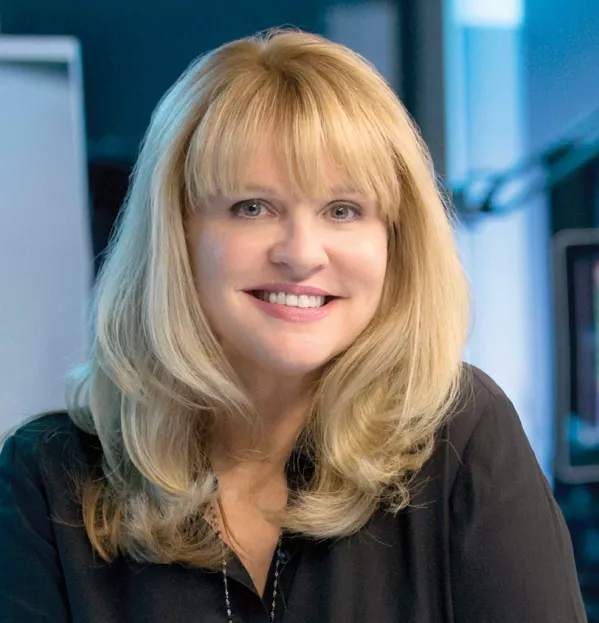TES talks to ... Mary Aiken

Any teacher who’s tried to unpick a case of online bullying that sprawls multiple social networks will take some comfort in the views of Dr Mary Aiken. She believes that it’s wrong to think teachers should - let alone can - be held responsible for doing that detective work.
“Teachers are being left to paddle their own canoe in cyberspace,” she says. “There’s been too much emphasis on making schools and parents responsible for dealing with issues such as cyberbullying and sexting, when I would say these are societal problems.
“It’s an issue of regulation and governance. It isn’t fair to expect parents and teachers to police children’s behaviour in a cyber context because it’s impossible for them to do so.”
As a world-leading forensic cyberpsychologist, Aiken investigates criminal behaviour in cyberspace. With a PhD in the subject, she’s worked with a veritable Who’s Who of agencies - from Interpol to the FBI.
However, in her new book, The Cyber Effect, she felt compelled to step back from the criminal world to look at society as a whole. With cybertechnology now often entering people’s lives while they’re still in nappies (think iPad activity seats for newborns), she believes that we need to take a long, hard look at how it’s affecting human behaviour.
“In Britain, the Association of Teachers and Lecturers has reported an escalation in problems associated with pervasive tablet use among pre-school-aged children, such as developmental delays in attention span, fine motor skill and dexterity, speaking and socialisation,” she notes.
Staying safe
Clear official guidelines on how (and how much) young children can use tech safely, and tighter regulation of tech products targeted at babies, are some measures that she believes are needed.
When children reach school, cyberbullying is one of her biggest concerns.
“Cyberbullying is very interesting,” Aiken says. “‘Real-world’ bullying is hard to tackle. Why? Because there’s no evidence of, say, a harsh word in the playground. Cyberbullying is nothing but evidence. So how did cyberbullying become a bigger problem than ‘real-world’ bullying?”
She thinks it’s time to fight tech with tech and hopes to design an algorithm that can track a child’s online communications, with parental consent, to spot bullying by logging content (eg, “die”, “bitch”, “hate”), direction (eg, from me to you) and interval/frequency.
“When bullying is identified, the algorithm would be triggered and a digital outreach could be sent to the child to say, ‘You’re being bullied, get help,’ and to the parent saying, ‘You need to talk to your child.’ The beauty is there’s no breach of parental trust - they’re not reading the child’s messages.”
It isn’t fair to expect parents and teachers to police cyber behaviour
This could be taken a step further, Aiken suggests: the data collected could be used to prosecute in severe cases, serving as a deterrent to malicious youths.
“The reason we get this sort of behaviour online is there’s a perception that nobody is in charge - that’s because nobody is in charge.”
Another big concern for her is sexting. “Back in the day, children played strip poker. Sexual curiosity is a normal part of development. But now, with technology, you’re often creating a permanent record and an explicit image of a minor is viewed solely through the lens of legislation on child pornography.
“So if you generate an explicit image of yourself and you’re underage, you’re de facto generating child pornography and might face prosecution and going on the sex offenders’ register.
“At one end of the spectrum, you have a 14-year-old girl sending an explicit image to her 14-year-old boyfriend. Yes, it’s about desirable behaviour, but it’s a social, not criminal, issue. At the other end, you have a child being groomed by an adult to generate an image. That’s a criminal issue.”
The law, she believes, needs to account for the difference between these cases. (It is beginning to catch up - just this week, the Crown Prosecution Service has published new guidelines for prosecutors on the subject)
Tighter regulation
She also worries about young people’s exposure to age-inappropriate material online, and would like to see tighter regulation.
“My argument is this: whether it is the internet service provider, the device manufacturer or the particular company that generates or offers the content, they’re collectively involved in the abuse of a child if children are exposed to damaging content.”
For Aiken, then, these are issues for government, statutory authorities, academics and tech companies to tackle - not just for parents and teachers.
“We need an investigatory body that could look at a whole-society approach and come up with recommendations,” she says.
She’s opposed to suggesting “helpful hints” for teachers to help them deal with cyber fallout in the classroom.
“I’m against sticking my finger in the dike - trying to patch it up,” she explains. “I think where teachers could be most proactive now is to form a lobby group to say they want to be part of the bigger conversation. The problems are ending up in the classroom, but there’s a greater societal responsibility to sort them out.”

While Aiken could be criticised for appearing to be anti-technology, this could not be further from the truth. In fact, she’s keen to promote a positive approach to cyber skills in schools.
“Young people who engage in hacking are exceptionally talented. But we have no way of identifying their skills when they come into school,” she notes. “We have IQ and EQ [emotional quotient], but we don’t have TQ [technology quotient]. I’d like to see the development of a technology quotient scale to identify incredible tech ability and engage with and reward it.”
For her, it’s all about a sense of balance - recognising the power of cybertechnology to do both bad and good, and taking charge of what we want from it for ourselves and our children.
Jessica Powell is a freelance journalist. She tweets @JPJourno
You need a Tes subscription to read this article
Subscribe now to read this article and get other subscriber-only content:
- Unlimited access to all Tes magazine content
- Exclusive subscriber-only stories
- Award-winning email newsletters
Already a subscriber? Log in
You need a subscription to read this article
Subscribe now to read this article and get other subscriber-only content, including:
- Unlimited access to all Tes magazine content
- Exclusive subscriber-only stories
- Award-winning email newsletters